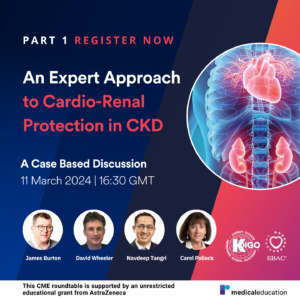
Learning Objectives
- Recall clinical evidence and guidelines for the management of CKD patients without diabetes
- Describe current gaps and barriers in evidence-based management for CKD without diabetes
- Apply evidence-based management strategies to a case study
- Use expert-led guidance to develop an optimal management approach to CKD patients without diabetes
Target Audience
- Cardiologists
- Heart Failure Specialists
- Nephrologists
- Primary Care Physicians
This CME program is supported by an unrestricted educational grant from AstraZeneca.
An Expert Approach to Cardio-Renal Protection in CKD’s program has been accredited by the European Board for Accreditation of Continuing Education for Health Professionals (EBAC) for 2 CME points, equating to 2 hours of learning. Physicians may convert EBAC External CME credits to AMA PRA Category 1 Credits™.